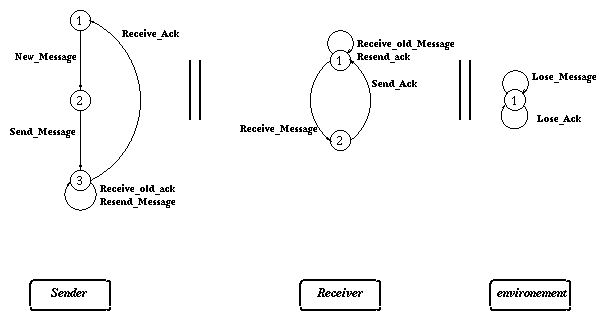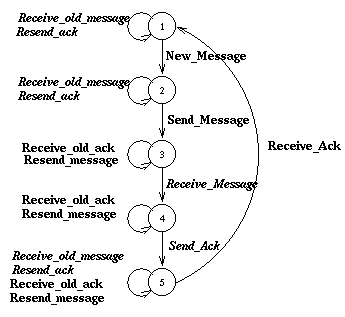An alternating bit protocol:
We consider an alternating bit protocol where sent messages are memorized.
the sent messages are sequences of integers.
alternating_bit : SYSTEM
BEGIN
IMPORTING alternating_bit_declarations
flagm,flagack : VAR bool
BEGIN
sender : PROGRAM
BEGIN
b : VAR bool
NB_mess : VAR massage
Cm : VAR message_channel
SIN : VAR message_list
BEGIN
"New_Message"
1:: true
---> NB_mess ::= NB_mess + 1 ;
b ::= (not b) ;
SIN ::= cons(NB_mess,SIN)
GOTO 2 []
"Send_Message"
2:: true
--->
Cm ::= (car(SIN),b) ;
flagm ::= true
GOTO 3 []
"Resend_Message"
3:: not (flagack and Cack = b)
--->
Cm ::= (car(SIN),b) ;
flagm ::= true
GOTO 3 []
"Receive_Ack"
3:: flagack and Cack = b
--->
GOTO 1 []
END
END sender
||
receiver : PROGRAM
BEGIN
c : VAR bool
OUTR : VAR nat
Cack : VAR bool
ROUT : VAR message_list
BEGIN
"Receive_old_message"
1:: (not flagm ) or getbit(Cm)=c
--->
Cack ::=c ;
flagack ::= true
GOTO 1 []
"Receive_Message"
1:: flagm and getbit(Cm)/=c
--->
OUTR::=getmess(Cm) ;
ROUT ::= cons(getmess(Cm),ROUT)
GOTO 2 []
"Send_Ack"
2:: true --->
flagack ::= true ;
Cack ::= (not c) ;
c::= (not c)
GOTO 1 []
END
END receiver
||
env : PROGRAM
BEGIN
BEGIN
"LOSE_MESSAGE"
1:: true
---> flagm ::= false
GOTO 1 []
"LOSE_ACK"
1:: true
---> flagack ::= false GOTO 1 []
END
END env
END
INITIALLY :
flagm = true and flagack = true
and b=false and c=false
and OUTR=0 and NB_mess = 0
and Cm = (0,b)
and Cack = false
and pc1=1 and pc2=1 and pc3=1
and SIN=null and ROUT= null
END alternating_bit

The PVS imported theory alternating_bit_declarations contains the following
declarations:
alternating_bit_declarations : THEORY
BEGIN
message : TYPE = nat
message_channel : TYPE = [message,bool]
message_list : TYPE = list[message]
getmess(C:message_channel):message = proj_1(C)
getbit(C:message_channel):bool = proj_2(C)
END alternating_bit_declarations
Using abstraction techniques, the following abstract state graph is
generated automatically. The abstract state is defined using the predicates
P1 : getbit(Cm)=c
and P2 :Cack=b

There are five abstract states, where each state is a record :
[#control,valuation(P1,P2)#]:
state 1 : [# control = (1, 1, 1)
valuation = p1 and p2 #]
state 2 : [# control = (2, 1, 1)
valuation = p1 and (not p2) #]
state 3 : [# control = (3, 1, 1)
valuation = (not p1) and (not p2) #]
state 4 : [# control = (3, 2, 1)
valuation = (not p1) and (not p2) #]
state 5 : [# control = (3, 1, 1)
valuation = p1 and p2 #]
The global control configuration (2, 2, 1)
(that is, pc1 = 2 and pc2 = 2 and pc3 = 1)
is not reachable.
Back to the Invariant Checker home page

